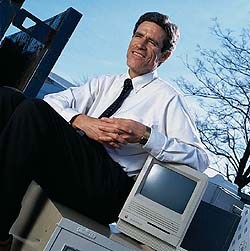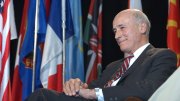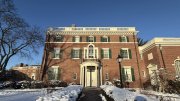 |
| Robert M Gogan, Jr. |
| Photograph by Stu Rosner |
Rob Gogan is Harvard's recycling and waste-management impresario. "It's a dream job," says the associate manager of Facilities Maintenance Operations. Why? "Harvard is the wealthiest university in the world, and affluence produces effluence. It's a rich vein of ore for a recycler." In the lot behind his office, at 175 North Harvard Street in Allston, is a hodgepodge of discarded stuff free for the taking: 40 metal storage cabinets from the Fogg Art Museum ("They'll go quickly to a Cambridge or Boston school," Gogan predicts); yards of battered swimming-pool lane dividers from Malkin Athletic Center ("A summer camp in Andover may take them"); swivel chairs; calculators; microwave ovens. About 85 charities are regular takers, but any individual who wants a thing may have it. Reusers "recover the utility" of at least 80 percent of these discards. It wasn't always so. In 1990 Gogan was working on a doctorate at the School of Education (he taught English for 10 years before that) when he became interested in recycling and saw that waste was endemic at Harvard. He made a pest of himself and got a summer job to demonstrate why a full-time recycling job made sense. He demonstrated, and got it. The University recycled 5 percent by tonnage of its waste--paper, cans, et cetera; these days a third goes around again. Gogan disseminates an e-mail newsletter at Harvard to report on recycling progress (and local flora and fauna sightings sent in by his readers) and to encourage a sense of community in a famously decentralized place. He feels good about providing people with opportunities to recycle: "Recycling gives everyone an easy way to achieve a little environmental grace."





